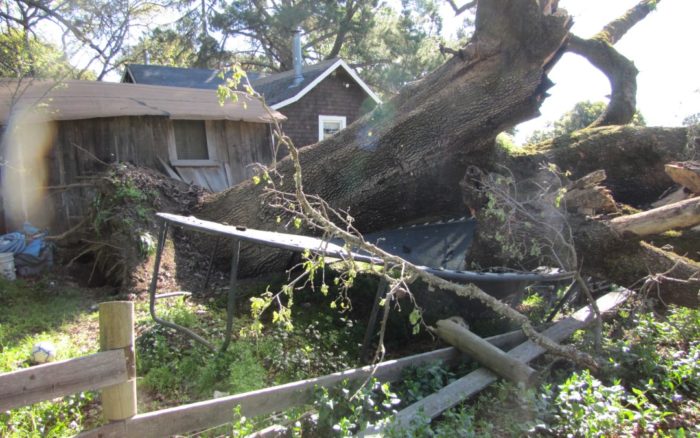Death of a Tree
“When an Old Friend Dies” was just published in the June issue of Psychological Perspectives. The article details an experience my husband and I had when an ancient valley oak fell last year. It is a tree we both loved. It grew next to a little pioneer farmhouse that we lived in while we built our current home. The tree itself was home to colonies of bees, to mourning doves and acorn woodpeckers, and, annoyingly, to a mockingbird who liked to sing her repertoire in the early hours of hot summer nights. A small shed had been built by the tree about 160 years ago, and this shed was probably the agent of the tree’s early demise. We mourned the tree, and in that mourning, used some of the biodynamic principles to make a preparation that has been very beneficial in this fourth year of severe drought in California. (See Making Barrel Compost, and Barrel Compost and Drought).
The article is a eulogy of sorts, but it is also a suggestion of the evolutionary possibilities of our times. The tree is a living entity. Goethe says it is an expression of a Being behind it. Relating to these Beings that live around us and that we so easily exploit necessitates an evolution of consciousness, one suggested in the story of the Fall from Paradise. This is critically important in our current crisis: Nature has needs and agendas of her own. She is not just here for our benefit, to be extracted from, but rather, to be related to. Or, as philosopher Dennis Klocek puts it, “The great theological question for millennia has been that, since nature has been separated from the divine by the Fall of the human from paradise, is the divine still present in nature as we experience it as human beings?”
You can access this article for free (at least, the first 50 people can!) at this link: Psychological Perspectives. Acknowledging spirit in matter is a rich experience, one that has helped us with our ranch and our farming, and perhaps can help us with our climate crisis.
